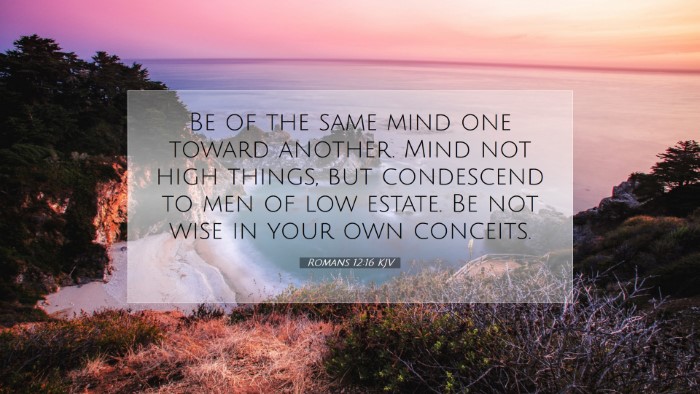Old Testament
Genesis Exodus Leviticus Numbers Deuteronomy Joshua Judges Ruth 1 Samuel 2 Samuel 1 Kings 2 Kings 1 Chronicles 2 Chronicles Ezra Nehemiah Esther Job Psalms Proverbs Ecclesiastes Song of Solomon Isaiah Jeremiah Lamentations Ezekiel Daniel Hosea Joel Amos Obadiah Jonah Micah Nahum Habakkuk Zephaniah Haggai Zechariah MalachiRomans 12:16
Romans 12:16 KJV
Be of the same mind one toward another. Mind not high things, but condescend to men of low estate. Be not wise in your own conceits.
Romans 12:16 Bible Commentary
Romans 12:16 - Commentary Overview
Verse: "Be of the same mind one toward another. Mind not high things, but condescend to men of low estate. Be not wise in your own conceits."
Introduction
The Epistle to the Romans, authored by the Apostle Paul, encompasses a profound theological groundwork for understanding Christian doctrine and living. Chapter 12 marks a pivotal transition focused on practical Christian living, detailing how faith manifests in the believer's everyday life. Verse 16 provides a succinct yet profound exhortation on interpersonal relationships within the Christian community.
Exegesis of Romans 12:16
- Be of the same mind one toward another:
This phrase emphasizes unity and harmony among believers. Paul urges the Roman church to cultivate a collective mindset that fosters mutual understanding and support.
- Mind not high things:
This directive warns against the pursuit of status or influence, advocating rather for humility and the recognition of shared human dignity.
- Condescend to men of low estate:
Paul encourages believers to engage with those who are marginalized or of lower social standing. This embodies Christ's own approach to humanity, where He broke barriers to serve the least among us.
- Be not wise in your own conceits:
This admonition speaks to the danger of pride. It warns against self-deception and encourages believers to seek wisdom through humility, acknowledging their limitations and dependence on God.
Theological Implications
This verse encapsulates core Christian values, emphasizing the importance of humility, communal bonds, and active concern for one another's welfare. The theological underpinnings suggest that true Christian love transcends social boundaries and reflects the character of Christ.
Insights from Public Domain Commentaries
Matthew Henry
Henry highlights that being of the same mind involves not only a shared belief but also a shared behavior that exemplifies Christian love. He elucidates how this unity should temper ambitions and desires for prominence, urging believers to engage with the less fortunate, identifying their needs as a priority in the community of faith.
Albert Barnes
Barnes provides a thorough exploration of the dual imperatives to avoid high-mindedness and to associate with the humble. He emphasizes that in humility, believers reflect the heart of Christ. He notes that real wisdom is shown in understanding our position before God, leading to a life characterized by service rather than ambition.
Adam Clarke
Clarke interprets the phrase "mind not high things" as indicative of the Christian's calling to reject prideful pursuits. He underscores the importance of empathy and outreach toward the downtrodden, positing that this embodies the essence of Christian discipleship. Clarke urges believers to maintain a self-aware posture, recognizing that true enlightenment comes not from worldly knowledge but from divine understanding.
Practical Applications
- Promoting Community Unity:
Pastors and leaders can use this verse as a rallying call for fostering unity within their congregations, encouraging members to work toward common goals grounded in love.
- Addressing Social Disparities:
In a world often divided by class and status, Romans 12:16 challenges believers to actively seek relationships with those outside their usual social spheres.
- Encouragement for Humility:
This verse serves as a reminder for both individuals and church bodies to practice humility in their interactions, emphasizing that wisdom is rooted in the acknowledgment of reliance on God.
Conclusion
Romans 12:16 stands as a vital exhortation to the Christian community, urging believers towards humility, unity, and compassionate engagement with all people. By embracing these tenets, one cultivates a reflection of Christ's love in their lives and communities. This passage invites further reflection on how these principles can be lived out daily, advocating for a faith that is integrally linked with actions of grace and humility.


